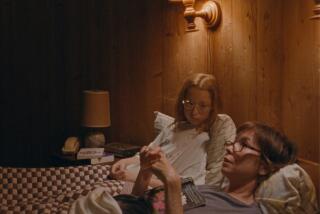A PATCHWORK PLANET.<i> By Anne Tyler</i> .<i> Alfred A. Knopf: 286 pp. $24</i>
- Share via
In the Baltimore railroad station a well-dressed man goes from one waiting passenger to the next, looking for someone to carry an envelope to Philadelphia. His daughter, on the way to Europe, has forgotten her passport and will meet the train there.
All this is observed with lively fascination by Barnaby Gaitlin, an extremely nice but unsteady young man with a consuming interest in other people’s lives and a hazy notion of his own. Despite a comfortable background, he has been working for 12 years at “Rent A Back,” a temp agency that does household errands for the aged, infirm or just plain disinclined.
It is an Anne Tyler kind of beginning, faintly screwy, and it goes on that way. Barnaby sits himself across the aisle from the pleasantly calm woman who accepts the package, chafes when she doesn’t open it--he would have--to make sure what’s inside and checks to see that it is properly picked up at the Philadelphia end.
Later he will decide that the calm woman, a bank officer named Sophia, is the one to transform his life. After a sequence of faintly misdirected or misapprehended attachments and collisions, he will conclude that transformation lies not quite there, though not far away either.
Tyler is our fictional double agent. She embarks with a seeming normality of story, characters and setting (Baltimore, invariably, and a white-bread, white and cheerfully non-Gothic Baltimore) and packs tiny bombs in her luggage. Nothing crashes or is destroyed, but the navigational equipment is confused, and the flight loops gradually off-course. Even when it gets back on-course, what we are left with is not assurance shattered, but the realization that it is in the nature of assurance for anarchy to cling to its underside.
In a way, Tyler is as absurdist as any of her flashier contemporaries. It is an absurdity not by black light but by golden light. It is an absurdity that instead of standing at an opposite remove from love, family and middle-class life, implants itself in their midst. Paradoxically, it reinforces them by rendering them comically precarious.
It renders Tyler precarious, as well. In setting her drama of the absurd so close to the drama of sentiment--because she refuses, uniquely, to distinguish them--she risks drowning it. Her characters, one foot embedded in earth and gaining reality thereby, cannot make large dramatic leaps. The startlement is in their small, peculiar movements--imagine a one-legged dancer--and their invariably round-trip fugues.
Even the fugues painstakingly recreate what they are in flight from--Mason, in “The Accidental Tourist,” carefully packs his Baltimore habits on his travels; the wife in “Ladder of Years” re-establishes domesticity in her zany escape from it--and become oddly more adventurous because of it.
At the same time, they are within a hairsbreadth of the humdrum. Flying so wackily close to the ground, Tyler comes close to grounding. It is the energy of her inventiveness that allowed her to maintain lift in her three splendid recent books: “Tourist,” “Ladder” and “Breathing Lessons.” In the new novel, “A Patchwork Planet, the energy and the lift fail.
There is much in “Planet” recognizable from previous Tyler: a gently whimsical central character trapped by depressive confusion and an array of quirks, a lunge out of the trap in a wrong direction that eventually points to a right one, an amiably eccentric family ruled by its family story. There is the author’s limpid, comically ambling style and above all, her integrity: a mercy and respect for even her most ludicrous characters.
Barnaby’s family story goes back to his great grandfather, a wood-worker who founded the family fortune by inventing a clothes dummy used by turn-of-the-century clients. They would assemble their elaborate outfits upon it and see what would go with what. “Those oldtime inventions slay me,” comments Barnaby’s fellow Rent A Back worker, the fiery, wiry Martine. “People used to try so hard, seems like.”
The original Gaitlin insisted he was inspired by an angel; a big, blond woman who came into his shop, proposed the device and left. Since then, each Gaitlin scion has claimed some equivalent angel to set his life right. Barnaby is ready for his.
He has been assigned the role of family problem since adolescence, when he used to break into neighbors’ houses and steal personal items such as letters and souvenirs. (It was their lives he was interested in, not their valuables.) He has no career, his mother nags him, and his wife has left him and moved to Philadelphia with their daughter and threatens to end his once-a-month visits.
Then comes Sophia, whom Barnaby meets by sitting next to her on a second trip to Philadelphia and spilling her coffee on her. Plump, blond and unremarkable-looking, she captivates him by her opposite qualities of calm and orderliness. He, in turn, captivates her by the kindness with which he treats everyone, particular the cranky collection of aged clients for whom he moves furniture, drives, shops, puts their Christmas trees up and their garbage out and--his adolescent dream--inserts himself amiably into their lives.
Sophia is attracted, as well, because in his disorder and mildly delinquent past, Barnaby too is something of an opposite. The up-and-down curve of their relationship, dotted with goofy incident and prickly family scenes--his parents are noodges, her mother is a horror--illustrates a Tylerian lesson. The attraction of opposites can peter out when the attraction subsides and the opposites remain. Also, as Barnaby reflects, “Angels leave a better impression if they don’t hang around too long.”
The outcome need be neither revealed nor concealed. Martine keeps reappearing, though, and gingering up things when they go bland. And those who have read “Tourist” and “Saint Maybe” may recall the attraction of thin and peppery young women for Tyler’s cloudy and faintly loony heroes.
It is because they are so close, in form, to placid domestic comedy, that Tyler’s novels require a rare imaginative vitality to become something larger and more rending. She brews her tempests in a teapot, and some critics dismiss her because of it. They forget, perhaps, that we are teapots.
Despite its virtues, “Patchwork Planet” rarely does more than simmer. Sophia’s ambiguous charm and constraint remain a sketch; Martine is intriguing but wispy. The hint of class resentment in Barnaby’s mother--she married into a wealthier family--never manages to integrate her alternating anger and apologies. The family imbroglios, which Tyler can perform with such exhilarating fireworks, are muddy and sometimes just plain mean.
Finally, it was a mistake to give Barnaby a narrator’s voice. A first- person narrator does not necessarily deprive a novel of a character, but unless extremely well done, it can deprive it of the character’s mystery. Barnaby is too low-spirited to light up himself or the book; Tyler would do it much better.
More to Read
Sign up for The Wild
We’ll help you find the best places to hike, bike and run, as well as the perfect silent spots for meditation and yoga.
You may occasionally receive promotional content from the Los Angeles Times.






